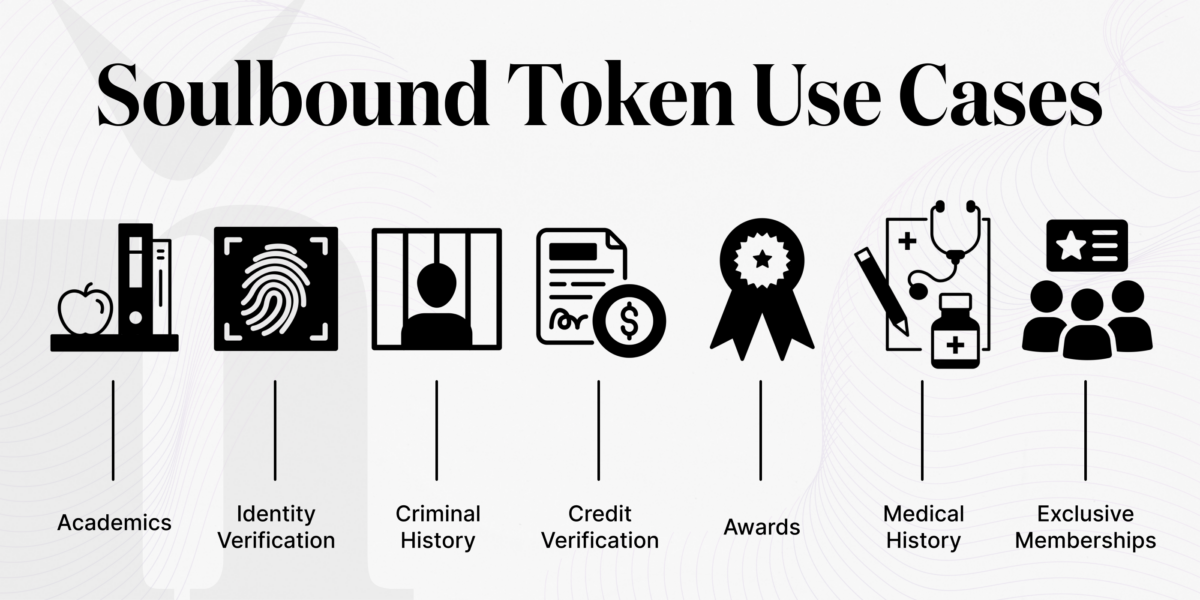Assume again to Could of 2022. Spring is right here, the NFT100 is a month away, and Ethereum Co-Founder Vitalik Buterin simply made an enormous announcement: Soulbound Tokens (SBTs). The thought — which got here through a white paper entitled “Decentralized Society: Discovering Web3’s Soul” — conjures up “oohs” and “ahhs” all through the metaverse. That very same month, the paper’s co-author E. Glen Weyl states that early makes use of of SBTs could also be obtainable by the tip of 2022.
But, quick ahead to January 2023, and the place are all these early use-case SBTs to be discovered? Did the NFT area glaze over this probably paradigm-shifting expertise in favor of extra Bored Ape derivatives… once more? Or is there merely an absence of infrastructure to create SBTs within the first place? Possibly each, or possibly neither — as a result of SBTs are right here, however they’re nonetheless removed from their last type.
What are Soulbound Tokens?
In plain phrases, Soulbound Tokens are NFTs which are non-transferable, making them excellent for managing everlasting information (versus storing paperwork in your protected deposit field). However taking up paper information is barely a single operate of those NFTs. As a result of in accordance with Buterin’s paper, SBTs will operate as a complete suite of instruments for on-line customers to protect and defend their id.

Over the previous 12 months, it’s change into widespread sentiment that, ought to SBTs be adopted as initially deliberate, they stand to influence our on a regular basis lives considerably. By means of SBTs, medical information, educational achievements, alumni standing, employment histories, felony information, and all the things in between could be minted as an NFT with immutable and non-transferable possession. This may very well be particularly helpful for healthcare directors and hiring managers. However thus far, SBTs have but to succeed in the surface world.
The place Soulbound Tokens presently stand
Whereas SBTs have but to be adopted into mainstream society (or NFTs, for that matter), there are nonetheless present Soulbound efforts coming to fruition on the blockchain. Not in droves, as some could have imagined after the preliminary white paper launch, however a choose few have taken it upon themselves to assist usher in a brand new part of Web3 id.
One such enterprise aiming to innovate inside this burgeoning sector comes from MoonPay. In 2023, the corporate, helmed by CEO Ivan Soto-Wright, is poised to assist outline the potential of SBTs in our present blockchain local weather by launching the Web3 Passport. Billed as a “next-generation loyalty and rewards program,” the passport will grant holders assured entry to unique experiences and merchandise from MoonPay companions and different main manufacturers and creators. This Soulbound NFT providing may show to be particularly helpful to Web3 model constructing.
However after all, MoonPay is a single participant within the rapidly rising SBT sport. Whereas it may probably be essentially the most NFT-native SBT providing on the horizon (other than an adjoining Pudgy Penguins endeavor), different entities have begun breaking floor on Soulbound tasks that aren’t essentially depending on NFT tech or tradition. From the Tenora blockchain planning to go Soulbound sooner or later to Crypto VC LongHash pondering an SBT reward system, and even a collaborative enterprise from MetaMask, Cobo, and Gnosis Secure within the works, organizations from quite a lot of sectors have expressed curiosity in Soulbound Tokens.
Even so, contemplating how contemporary the idea of SBT is, the practicality of the brand new kind of token should be at giant. Whereas real-life SBT purposes — like tokenized diplomas from the Nationwide College of Mongolia and potential SBT trials launching through Japanese banking big SMBC — have proven that Soulbound Tokens have each incentive to enterprise away from Web3 nativity, they nonetheless really feel like a novelty that falls in need of speaking the complete potential of SBTs.
The problem of infrastructure
Maybe this perceived shortcoming is extra a problem of type vs. operate, although. At the moment, there are few strategies by way of which NFT issuers can present protected, usable non-transferable tokens at scale. Contemplating the constraints of SBTs as outlined by Buterin’s white paper (that SBTs won’t be achievable till we’ve entered right into a decentralized society the place everybody has a “Soul” pockets), these hoping to launch SBTs should first create infrastructure and protocol that might grant SBTs operate. Both that or place their bets on a sequence or platform to take action for them.
That is exactly why some, like Masa Finance, are already tackling technological roadblocks head-on. With Masa’s January 2023 Ethereum mainnet launch, the corporate sought to empower customers to mint quite a lot of Soulbound Tokens — together with Soulbound Identification SBTs, Web3 credit score experiences, and distinctive .soul area identify NFTs — by itself distinctive platform, which facilities round a decentralized credit score protocol.
Though the discharge was certainly an enormous step ahead for digital id, and one which has opened the door for Masa to begin including biometric authentication, multi-level permission, and Web3 mortgage capabilities to its protocol, it’s additionally an achievement that Masa Co-Founder Brendan Playford admits can’t exist in a vacuum.
“It’s powerful going to market with an id protocol the place the primary use case is credit score. The most important drawback id protocols have is chilly beginning. If you happen to don’t have one thing somebody can use their id for, you’re not going to trace these first customers,” Playford stated in an interview with nft now.
A staunch believer in SBTs to drive mainstream adoption, Playford could have hit the nail on the pinnacle in discussing the present points with bringing the tokens to market. Along with the shortage of infrastructure obtainable to essentially make SBTs work at scale, if buyers and customers can’t instantly see how Soulbound Tokens may very well be helpful, it begs the query of why they might need to mint and maintain an SBT within the first place.
Wen mainstream SBT adoption?
So, when would possibly we see the more and more elusive use circumstances of SBTs change into a serious a part of the NFT ecosystem? The reply is something however easy. As a result of whereas the advantages of SBTs appear to outweigh the caveats, it’s anybody’s guess as to when a decentralized society would possibly change into a possible actuality.
For now, movers will possible proceed to hunt out new and novel methods to make the most of SBTs, slowly laying the muse for them to change into pertinent within the subsequent market cycle or the one after that. After all, Masa and MoonPay’s SBTs will carry worth to the NFT area and Web3 at giant. However till main monetary, medical, and academic organizations (and the like) are prepared to switch antiquated credentialing fashions with a extra immutable and efficient system that may very well be potential by way of SBTs, the true utility of those tokens can’t be realized.



